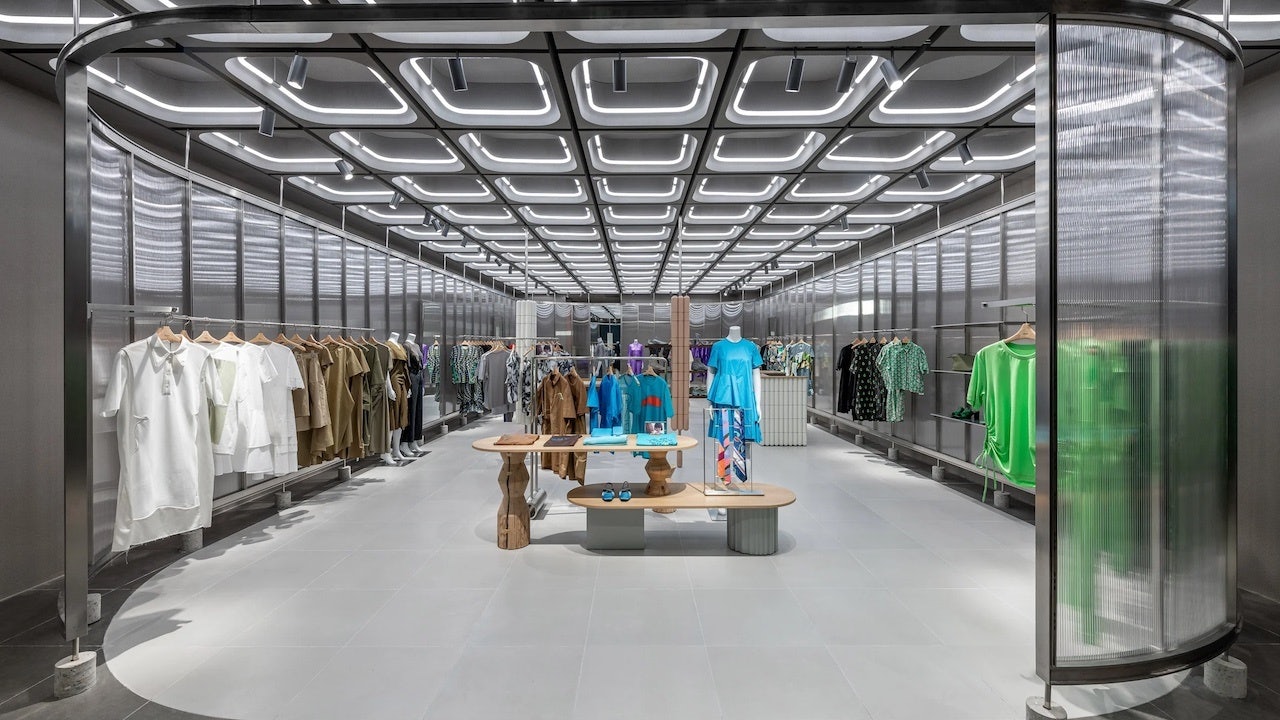Battered by unpredictable COVID lockdowns and flagging consumer confidence amid a broader economic slowdown, China's retail environment has been challenging for foreign and domestic brands in 2022. But amid the decidedly mixed financial results released over the past few months, there are signs that some homegrown brands stand to gain when the economic picture improves, having hit the right notes among local consumers and jumped on the right trends at the right time.
Among the fashion groups poised to benefit, given it avoids repeats of previous controversies, is the Hangzhou-based JNBY Group. Founded in 1994, the company has built one of mainland China’s most prominent fashion portfolios, expanding beyond its flagship JNBY brand with menswear line Croquis (速写), minimalist professional brand Less, kids-and-teen brands jnby by JNBY and Pomme De Terre (蓬马) and homeware and loungewear line JNBYHOME. By the end of last year, the group operated 1,996 physical retail stores worldwide and offered global e-commerce, giving it international reach beyond its home market.
While other Chinese fashion groups like the supremely troubled Shandong Ruyi have sought the global limelight and publicly announced plans to be the “LVMH of China,” JNBY has taken a more low-key approach that’s slower than fast fashion and lower than high-end, succeeding in the crowded middle-market. "Steady" is the name of the game for JNBY, with the company managing to limit the damage of a slowing economy and Beijing's so-called "dynamic-zero" COVID policy on its bottom line while shifting focus to its top-performing portfolio brands and trimming the fat from its underperforming labels.

According to Chinese-language sources, the JNBY Group saw total revenue decrease one percent to 4.08 billion yuan ($588.3 million) in the 12 months ending June 30 with net profit falling nearly 14 percent to 559 million yuan ($80.6 million), which the company attributed to the disruption of repeated COVID lockdowns in key cities like Shanghai. But where JNBY's results get interesting is in what its group-wide results might reflect about China's broader consumer trends. Flagship brand JNBY — which accounts for around 56.5 percent of group revenue and is predominantly aimed at more mature demographics — recorded a year-on-year revenue increase of just 0.6 percent to 2.31 billion yuan ($333 million). This is a significant slowdown, again attributed mainly to sporadic COVID lockdowns, after the company recorded a more than nine percent increase in the first half of the fiscal year.
Menswear brand Croquis, which accounts for around 16 percent of group revenue, dropped 6.8 percent to 645 million yuan ($93 million) in the 12 months up to June 30, while youth-focused line jnby by JNBY fell nearly 10 percent to 592 million yuan ($85.3 million). However, the company's premium minimalist line Less rose 17.8 percent to 460 million yuan ($66.3 million), accounting for 11.3 percent of the group's total revenue. As of the end of the reporting period, the JNBY Group had a total of 1,956 retail stores, a net increase of 25 over fiscal year 2021, with the core JNBY brand operating 921 stores (a net decrease of five over the past year).
So where is the good news? According to the JNBY Group, it's online. In its most recent financial report, JNBY projected a continued slide in offline sales but a 3.6 percent increase in e-commerce sales, particularly those facilitated by its BOX+ (不止盒子) delivery service and WeChat Mall. But the company also expects growth to come from its portfolio brand Less, which looks to be the best positioned for the current moment. The brand has beefed up its marketing and branding efforts, unveiling a new Japandi-tinged visual brand image by Japan’s Irobe Design Institute earlier this year. The ultra-clean rebranding and recent collections by LESS indicate the brand is poised to take on the more premium lines of global competitors such as H&M’s Arket. But perhaps more interestingly, Less named 47-year-old actress Zhou Xun as its official brand ambassador in July, a move that has gone over very well among the company's core demographics.

For its part, flagship line JNBY is moving to the metaverse in an attempt to tap a trend that has attracted brands around the world. JNBY recently launched its "Eastern Wonderful" (东方妙人) campaign and announced plans to release three sets of limited-edition virtual outfits starting this month. The company is also jumping on China's so-called virtual anchor trend in its efforts on the fashion-focused platform Xiaohongshu in an attempt to reach younger consumers. Group-wide, the focus in the year ahead will be to tap China's "fan economy" (which remains active, despite an ongoing government crackdown), further optimize its premium brands, and consider brand acquisitions while investing in its design and R&D capabilities.
Will this be enough to drag underperforming portfolio brands back to the black? Unfortunately, this is difficult to tell at the moment as it will depend less on consumer demand and more on the central government in Beijing. If the government refuses to budge on its dynamic zero-COVID policy and consumers remain hesitant to hit the mall, and if the economic outlook remains pessimistic in the months ahead, JNBY might find all of its on- and offline efforts to be an expensive branding exercise rather than revenue drivers.
That said, domestic analysts have remained cautiously optimistic about JNBY's prospects over the long term. A report by Guoyuan Securities published in late May noted that JNBY's short-term performance remains under pressure due to COVID lockdowns, yet the group's unique designer culture and investment in its in-house brands have helped it maintain credibility among its target consumer. The group also stands to benefit from growing local consumer demand for niche brands, which should boost the likes of Less in the year ahead.

